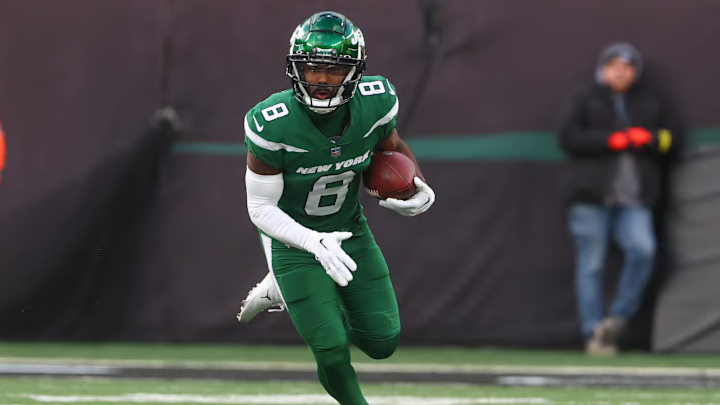The NY Jets have traded wide receiver Elijah Moore and a third-round pick to the Cleveland Browns in exchange for their second-round pick. The move gives Cleveland a talented young wide receiver for cheap while offering the Jets additional draft flexibility.
But why did the Jets do it? Why did the Jets agree to send one of their promising young offensive building blocks to Cleveland for the equivalent of a high-third-round pick, at best?
The simplest answer is that it helps the Jets in their continued pursuit of Aaron Rodgers. The plan doesn't appear to be to replace Moore with the newly-signed Mecole Hardman, at least, it shouldn't be.
But the Jets acquiring that additional second-round pick allows them increased flexibility in their negotiations with the Green Bay Packers.
The Elijah Moore trade helps the NY Jets in the eventual Aaron Rodgers trade
The Jets obviously want to hold on to their first-round selection at pick No. 13. That's been one of the biggest holdups in Rodgers negotiations to this point. But the Jets also would love to retain the high second-round pick that they have as well.
Prior to this trade, that wasn't a realistic scenario. Now, the Moore trade allows the Jets to send either pick 42 or 43 (both of which they now own) to the Packers along with whatever additional draft capital they surrender.
The Jets are eyeing someone with that high second-round pick, quite possibly someone like Minnesota center John Michael Schmitz. If not Schmitz, a defensive tackle, safety, or even a wide receiver now makes sense.
The Moore trade allows the Jets to make two top 50 picks and still trade for Rodgers. That, probably more than any other reason, is why the Jets made this trade.
They're essentially looking at this situation as a math equation. They're figuring that pick 42/43 plus whoever they replace Moore with (Odell Beckham, DeAndre Hopkins, draft pick, etc.) is more valuable than just Moore.
For instance, they would rather have Schmitz and Beckham than Moore by himself. It's a fair argument, especially if their plan wasn't to keep Moore around long-term.
Of course, this trade could backfire on the Jets. If Moore goes to Cleveland and becomes the star he's shown flashes of being in the past, the Browns would have just traded the equivalent of a third-round pick for a star receiver on his rookie contract.
The Jets are willing to take that risk, however, not necessarily because they don't believe in Moore — although if they believed in him enough he wouldn't have been traded — but more so because of that additional draft flexibility.
The Aaron Rodgers trade, and the fallout from the deal, remains the most important storyline of the Jets' offseason. This trade helps them facilitate the deal and retain the draft capital they wanted to keep.
They can have their cake and eat it too at the expense of Elijah Moore.
